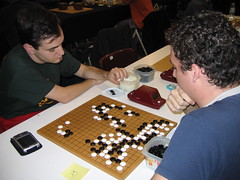Last weekend I took part in the Barcelona’s Go Tournament. As every year many people from Europe came to enjoy the nice weather of Barcelona, while playing some tough games. Three Koreans took the top positions, and among them, my Go (or Baduk) teacher, Lluis Oh 6 dan.
 My score was 2 wins from 5 rounds… quite bad result from what I was expecting to. I beat a French in the 1st round, with somehow good style. In the 2nd round I played with Jordi, a local friend who is overrated. I was winning the game easily, when I made a stupid mistake, and lost a quarter of the board… luckily I still won by 1.5 points. From that point on, I started to made unbelievable mistakes, removing my possibilities of winning. I played with Sergio, a guy from Alicante, in the 3rd round… despite I killed a really big group (the black one in the picture), he decided to continue playing, and I was too calm and confident about my win. This led me to disaster: I lost by 0.5 points. On Sunday I played the last two rounds, making big mistakes that force me to resign both games.
My score was 2 wins from 5 rounds… quite bad result from what I was expecting to. I beat a French in the 1st round, with somehow good style. In the 2nd round I played with Jordi, a local friend who is overrated. I was winning the game easily, when I made a stupid mistake, and lost a quarter of the board… luckily I still won by 1.5 points. From that point on, I started to made unbelievable mistakes, removing my possibilities of winning. I played with Sergio, a guy from Alicante, in the 3rd round… despite I killed a really big group (the black one in the picture), he decided to continue playing, and I was too calm and confident about my win. This led me to disaster: I lost by 0.5 points. On Sunday I played the last two rounds, making big mistakes that force me to resign both games.
The lesson learned (I hope I learned it) is: “small things are the key“. My teacher says I’m at least 1 dan… because I know a lot of theory, I have good intuition, etc. But I do fail in small problems, like easy-solving situations. I’m speaking about these kind of situations where I must solve them at sight, without doubts. How can I advance if I don’t solve easy situations? Concentration, read out all the movements. I must practice more, and improve my concentration, my brain skills!
I will write in catalan because what I want to say it’s too difficult for me to express it in English. Sorry.
Crec Liopic que vas tenir dos problemes: el primer, molt tontaina, és la “funny game” amb en Jordi, que vulguis que no, desconcentra.Però això és puntual.
El segon, és el mateix problema que he arrastrat jo durant la meva -curta- carrera goística: les expectatives que els altres han posat sobre nosaltres. No és qüestió de concentració, al contrari: estem tant concentrats en què aquella partida s’ha de guanyar perquè estem a un nivell superior a ella, que perdem per tonteries. Segur que hem calculat tesujis, situacions d’avançada, sabem que els nostres grups són forts i sabem quins grups hem d’atacar… però fallem al fer-ho realitat, en plasmar els nostres pensaments en el tauler, perquè aquests han anat més enllà de la partida real que teníem davant.
Tu has dit, ets primer dan… aquí hi ha les expectatives que et pressionen en excès. Has de demostrar que ho ets, no pots fer el “ridícul” d’aquesta manera amb aquests problemes tan “fàcils” però que t’acaben arruïnant la partida. Oblidat de les categories, oblida-te del teu profe, del què dirà, de les classes, de tot. Tanca els ulls, escolta la música que sona dins el teu cap i deixa que les pedres flueixin. Aleshores serà quan tota la teoria que tens a dintre sortirà a fora i … de cop i volta, seràs primer dan. De debó, amb els teus punts. Perquè jo crec també que pots ser-ho, i més encara. Però només en el moment en què deixis de considerar-ho la teva meta.
Stones must flow over the game board. Stones have to flow over the game board. Don’t try to control them, just let them flow… and they will show you the correct way.
No, si no considero arribar a dan una meta. Al post em referia més be a que vaig tindre problemes de concentració en les “petites” coses, i.e. si conto a un grup tres llibertats on nomes hi han dos, o si (pitjor) em fico a un semeai de la hòstia sense mirar si tinc llibertats… amb això millor es abandonar les partides (això vaig fer), i jugar un altre dia.
Curiosament ahir li vaig ensenyar al Lluís les meves partides i va flipar al sentir que vaig abandonar… hi havia molt per fer encara en moltes d’elles…